- Home
- Nancy Mitford
The Penguin Complete Novels of Nancy Mitford Page 8
The Penguin Complete Novels of Nancy Mitford Read online
Page 8
They practically lived in the billiard-room, hard at work the whole time, Albert making still-life compositions for his photographs, while Jane copied designs from chintzes and pieces of needlework in water-colours.
One day she was poking about in the attics trying to find more treasures for the catalogue when she noticed, poked away in a corner behind piles of furniture, a dusty glass dome. After a dangerous climb over rickety chests of drawers, derelict bedsteads and other rubbish, she managed to secure it and carry it to her bedroom, where she carefully removed the dome, which was opaque with dirt, expecting to discover some more wax fruit. Underneath it, however, she found to her amazement a representation in white wax of Jacob’s Ladder. It was quite perfect. Jacob, in a sort of night-gown and an enormous beard, lay upon a floor of green plush. His head rested on a large square stone, and from just behind this rose the ladder, delicately balanced against wax clouds which billowed out of the green plush. Two angels were rather laboriously climbing on it (whether up or down it would be hard to say), while three more angels, supported by wires which rose from behind the clouds, hovered round about, twitching and quivering delightfully whenever the stand was moved.
Jane washed and replaced the dome, and then carried this treasure down to the billiard-room in great triumph. When Albert saw it his joy and delight knew no bounds.
‘It is easily our most important find and shall be the frontispiece of my book!’ he cried. ‘I have never seen anything half so lovely. It is a poem! How can I find out the name of the artist? I must endeavour to do so without delay. But how sad, my dear, to think that this jewel should belong to people who so evidently have no feeling for beauty! It ought, of course, to occupy a place of honour in a museum. Never mind, I shall photograph it from every angle and in all lights, so that the artistic public will be able to gain some slight idea of its exquisite form, and thus share, to a certain extent, in my own emotions.’
At that moment Lady Prague was seen to pass by the open door, and Albert, longing to share his enthusiasm with somebody, rather thoughtlessly dashed out, seized her by the arm and said:
‘Lady Prague, do come and see our wonderful new find. Something to cause the greatest sensation among all cultured persons – so amusing, so exquisite, so stimulating …’
With the naïveté of a child showing off its new toy he led her up to the dome.
She stared at it for a moment, sniffed and said rather pityingly:
‘What a lot of drip you do talk. Why, that’s nothing more than a particularly unattractive form of dust-trap!’
She left the room.
All the excitement died out of Albert’s face and was succeeded by an expression of the deepest disgust.
‘Dust-trap!’ he muttered between his teeth. ‘You just wait until you see the booby-trap I’m going to make for you – you viviparous old vixen!’
Walter and Sally now came in and made up for Lady Prague’s lack of appreciation by an enthusiasm almost as unbounded as Albert’s. They walked round and round the dome, exclaiming:
‘How beautiful!’ – ‘How amusing!’ – ‘That angel’s so like Lord Prague, d’you see? And, of course, Jacob just is the admiral with a beard!’
Walter soon retired to write a poem beginning:
Green plush.
Admiral Jacob lay beneath a dome
Of crazy glass upon green plush.
And in this ‘nautical’ posture
With angels rising from the Guinness foam
The Admiral
(Who was Jacob, too, out of the Bible)
Fell, bucolically, asleep.
Even Lady Brenda was quite appreciative, saying that her children would simply love it.
‘It reminds me so much of a lodging-house at Westgate where we used to go for our summer holidays when we were small. Every room in it had several domes of that sort.’
Albert breathlessly asked the address of this gold mine, but Lady Brenda had forgotten it and presently left them to go out fishing.
‘What a disappointing woman that is,’ said Jane when she had gone. ‘I noticed her particularly in the train coming up here, and somehow thought she looked rather interesting. And then, when I heard her name, I was really excited to meet her. One’s always being told how charming she is – so original and cultured. But she’s a perfect fool, though I must say quite nice compared to old Prague.’
‘She is cultured in the worst sort of way,’ said Albert. ‘But original! Oh, dear! I had a long conversation with her yesterday after tea so I know all about her originality. I’ll tell you. She has, as I had supposed that she would, a green drawing-room with flower pictures which she picked up cheap (eighteenth century, so she says). She also has a stone-coloured dining-room with a sham stone floor. On the sideboard is a model of a ship. On the walls are old maps. The lights are shaded with maps. The firescreen is a map in needlework. The chairs are covered with petit point which she worked herself. Her bedroom is “very modern”; that is to say, it is painted silver and stippled all over. The ceiling is of Lalique glass as is the bed. The bathroom is painted to give the impression of a submarine forest. It has portholes instead of windows. I couldn’t quite understand why.
‘She reads few novels, but a great many “lives” and “memoirs”. Her favourite novelists are Galsworthy, Masefield, David Garnett and Maurois, she “loves modern pictures, especially flower pictures”, and admires some of John’s portraits, but thinks Orpen the finest living artist. She has never been to the Tate Gallery, but always means to go.
‘All this she told me herself, or rather I dug it out of her. I also gathered that she goes every year to the Ascot races in one of those picture-hats and a printed dress.’
‘Four of them, you mean,’ said Jane.
‘Very likely. She goes quite often to the Embassy Night Club, but seldom stays up later than one or two o’clock. She has a great deal of committee work when in London, mostly connected with animals. Every year she goes for three weeks to Switzerland. Captain Chadlington prefers to stay at home and kill (foxes and birds), so she always goes with her great friend, Major Lagge, chaperoned by his sister and brother-in-law. Those sort of women, I have so often noticed, never take lovers, but they have some great friend with whom they go about literally like brother and sister. It is all most peculiar and unhealthy. I think, myself, that she is a creature so overbred that there is no sex or brain left, only nerves and the herd instinct. There are many like that in English society, a sufficiently uninteresting species. I find her, in a way, beautiful.’
‘Oh, yes, she is certainly that,’ said Jane, ‘although personally, I can’t admire her very much. She has such a maddening expression. And she’s really very nice, too, you know. She’s been sweet to Sally and me.’
‘And her husband is good-looking. But what a dreary personality he has, most uncompanionable. I suppose he will in time become a sort of Murgatroyd, although I doubt whether he will ever acquire that joie de vivre which so characterizes the dear general.’
‘Beastly old man!’
‘Ah, no, Jane! I must admit to a very great penchant for the general. He is so delightfully uncompromising. Yesterday I heard him say that before the War the things he hated most were Roman Catholics and Negroes, but now, he said, banging on the table, now it’s Germans. I wonder what he would do if he met a Roman Catholic Negro with a German father! Dare I dress up as one and see? I could black my face, wear a rosary and Prussian boots and come in crossing myself and singing “The Watch on the Rhine” to the tune of a Negro spiritual.’
Jane laughed.
‘I’m afraid you must think me rather idiotic, my dear Jane. I have been in such spirits since I came up here. I can assure you that I am quite a different person in Paris – all hard work and no play, or very little. But, after all, it is the “hols.” here, as we used to say, and talking of “hols.”,
do help me to think out a good practical joke for Lady Prague. How I hate that old woman! Do you think she and the general – Ah! General! What a delightful surprise! I imagined that you were busy stalking those grouse again.’
‘No, Gates, we are not. Very few moors can be shot over more than four times a week, you know.’
‘That must be a relief,’ said Albert sympathetically.
The general looked with some disapproval at his matelot clothes – a pair of baggy blue trousers worn with a blue-and-white sweater and a scarlet belt, and said severely:
‘If you will be so good as to clear that mess off the table, we were going to play billiards.’
‘Oh, sir, this is dreadful! You could not possibly play on the floor, I suppose? No? Well, if you’ll most kindly wait for one moment while I photograph this exquisite object which Jane has found, I shall be really grateful.’
Captain Chadlington and Admiral Wenceslaus now came in. The admiral was airing his favourite topic, Blockade.
‘Oh, it was a terrible scandal. Thirty thousand tons of toffee found their way through Holland alone, my dear Chadlington, and this is a most conservative estimate, worked out by my friend Jinks (whose book on the subject I have lent to your wife). Many of the Germans taken prisoner at that time by our chaps had their pockets bulging British toffee. British toffee, my dear Chadlington!
‘And then,’ he added, with a catch in his voice, ‘the glycerine!’
‘Were their pockets bulging with that, too?’ asked Captain Chadlington, who, as a prospective candidate for Parliament, was always ready to learn.
‘Not their pockets. Dear me, no! Far, far worse than that – their shell-cases!’
‘Oh, I say! That’s disgraceful!’
‘It is! Monstrous! But what I want to know is – who was the traitor? Read Page on the subject. He couldn’t understand it – not a word. He couldn’t make out what we were driving at. Why don’t they blockade? – What on earth are you doing, Gates?’
Albert, balanced gracefully on a step-ladder, was taking a photograph of the Jacob’s Ladder as seen from above.
‘There,’ he said, ‘that’s done. Now I will clear the table and you can play your little game.’
10
Jane and Albert did not stay to watch the billiards but strolled into the garden.
‘I saw them playing yesterday evening,’ said Albert. ‘It is a curious but not a graceful game, and terribly monotonous. If it weren’t such a beautiful day I should have advised you to watch them for a little, all the same: it is always interesting to see how others find their recreation. They play with ivory balls and long, tapering sticks.’
‘Yes, I know,’ said Jane. ‘Look! there’s Mr Buggins sketching.’
‘How delightful. We must go and talk to him.’
Mr Buggins was sketching the old part of the house in water-colours; that is to say, he had drawn it with a pencil and was now busy colouring it in with small, rather dry brushes. It was careful work.
When he saw Albert approaching he was very much embarrassed, knowing quite well the attitude of the professional artist to the painstaking amateur; so, to cover his own confusion and to save Albert from feeling obliged to make a polite criticism of his work, he began to talk very fast about the house and its history.
‘I love this part of the house, you know. That tower, and of course, the dungeons, were all that escaped the Great Fire in 1850. It is immensely old, probably eleventh century, and the walls are so thick that Lady Craigdalloch has been able to put two water-closets in the thickness alone.’
‘How jolly for her!’ said Albert, feeling that some remark was called for.
‘Yes, very. Of course you know the history attaching to that tower?’
‘No; do tell us, Mr Buggins. I was thinking that there must be some legends connected with the castle.’
Jane and Albert sat down on the grass, and Mr Buggins, clearing his throat, began his story.
‘One of the Thanes of Dalloch,’ he said, ‘as they were then called, had a very beautiful daughter, the Lady Muscatel. Her apartment was in that tower, where she would sit all day spinning. At night, when the moon was full, she would often lean out of her window and gaze at it, and one night she was doing so when she heard from beneath her a faint noise of singing. Looking down, she beheld the handsome features of a young man of high degree, who told her that he had lost his way while out hunting.
‘“Alas!” she said, “my father and brothers are from home, and I dare not open to you in their absence.”
‘He told her that he would not dream of trespassing on her hospitality and retired, fortified by a bottle of wine which she lowered to him in a basket.
‘The next night he came again, and the next, and soon they were passionately in love with each other. But little did the unfortunate Muscatel realize that her lover was the only son of Thane McBane, head of a clan which her father was even then planning to exterminate. The warlike preparations for this raid which were going forward in the castle left the Lady Muscatel more and more to her own devices, so that one day she was able to leave her tower and go with Ronnie McBane to the nearest priest, who married them. Even so they dared not fly, but thought it better to wait until they should hear of a ship bound for France. Poor children! They knew full well that both their fathers would see them dead sooner than married (for Ronnie had by now divulged his fearful secret).
‘At last Dalloch’s preparations were completed and he and his men sallied forth, armed to the teeth, to wipe out the McBanes. The battle was a fearful one, but the conclusion was foregone. The unfortunate McBanes, taken unawares and overwhelmed by numbers, fought with the courage of desperation. One by one they fell, but each one that died accounted for three or four of the Dallochs. Ronnie McBane was the last to succumb, and when he did so, bleeding from forty desperate wounds, it was with the knowledge that no fewer than thirty-two of his enemies, slain by his own hand, had preceded him. It was one of the bloodiest fights in the history of the clans.
‘That evening the Lady Muscatel heard sounds of merry-making in the great hall, where her father and the wild clansmen were celebrating their victory with wine and song. She went down to see what was happening and the first thing that met her eyes was Ronnie’s head, horribly mutilated, on a pike. The shock proved too much for her reason and she soon became insane, wandering about the house and crying for her lost love. When her child was born neither she nor it survived many days.
‘They say that at the full moon she can still be heard, wailing, wailing; and some even declare that they have seen her wan form, carrying the head of her lover.
‘But surely you have heard The Lament of the Lady Muscatel? No? It is a beautiful ballad. Personally, I think it one of the most beautiful that Scotland has produced, although it is comparatively little known. Let me see if I can remember it.’ And clearing his throat, he recited the following ballad:
The Lament of the Lady Muscatel
My lo’e he war winsome, my lo’e he war braw, 1
Every nicht ’neath my windie he cam’.
He wad sing, oh, sae saft, till the nicht it waur o’er
I’ the morn he was sadly gang ham’.
The pibroch i’ the glen is bonny,
But waley, waley, wheer’s ma Ronnie?
His e’en they were blew and his mou 2 it war red,
And his philabeg 3 cam’ to the knee;
But noo ma puir Ronnie he’s skaithless and deid,
Ah, wud that I a’so could dee.
The pibroch i’ the glen is bonny,
But waley, waley, wheer’s ma Ronnie?
I ganged ma gait sairly to yon branksome brae,
Wheer ma true lo’e war killed i’ the ficht,
I sat on a creepy 4
and I greeted 5 the day,
And I sat greeting there till the nicht.
The pibroch i’ the glen is bonny,
But waley, waley, wheer’s ma Ronnie?
Ah, Ronnie, my true lo’e, ah, Ronnie, mine ane,
Shall I niver muir see ye ava?
I see your life’s bluid poured out o’er yonder stane,
But your sperrit has flane far awa.
The pibroch i’ the glen is bonny,
But waley, waley, wheer’s ma Ronnie?
They gave me your heid, Ronnie, wropped oop i’ sae, 6
And I buried it ’neath yonder saugh; 7
For ye’ve left me, my Ronnie, to gang a’ agley
And I niver shall see ye nae muir.
The pibroch i’ the glen is bonny,
But waley, waley, wheer’s ma Ronnie?
Ma mither she mad’ me ane parritch o’ kail,
And she gave me ane snood for ma heid;
But a’ I can do is to greet and to wail,
Ah, Mither, I wud I were deid.
The pibroch i’ the glen is bonny,
But waley, waley, wheer’s ma Ronnie?
But e’er the sun rise, Mither, muir o’er the brae,
And e’er ane muir morrow shall dawn;
Ma heid on its pillow sae saftly I’ll lay,
But ma sperrit to him will ha’ flawn.
The pilbroch i’ the glen is bonny,
But waley, waley, wheer’s ma Ronnie?
There was a short silence, broken by Albert, who said:
‘How beautiful, and what a touching story! We must tell it to Walter; he will be so much interested and might, I feel, write one of his charming poems round it. I think the ballad quite the finest I have ever heard.’
‘I think so, too,’ said Mr Buggins, who had rarely known such an appreciative audience and was greatly enjoying himself. ‘To the student of medieval Scottish history it is, of course, extremely illuminating, being so full of allusions to old customs, many of which survived until quite recently.’

 The Blessing
The Blessing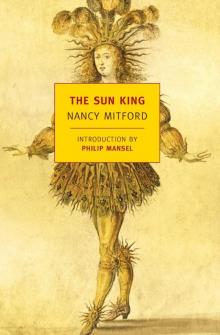 The Sun King
The Sun King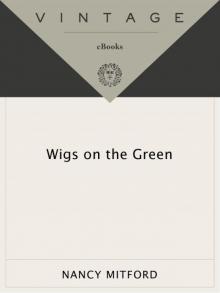 Wigs on the Green
Wigs on the Green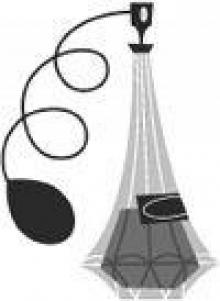 Love in a Cold Climate
Love in a Cold Climate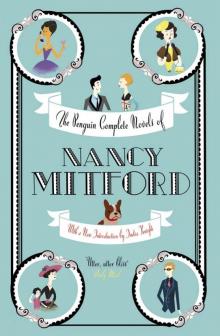 The Penguin Complete Novels of Nancy Mitford
The Penguin Complete Novels of Nancy Mitford The Pursuit of Love
The Pursuit of Love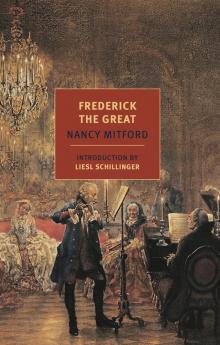 Frederick the Great
Frederick the Great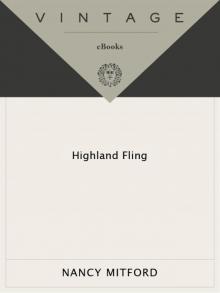 Highland Fling
Highland Fling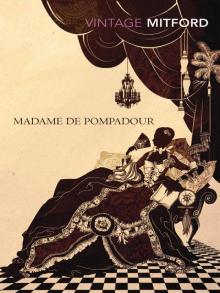 Madame de Pompadour
Madame de Pompadour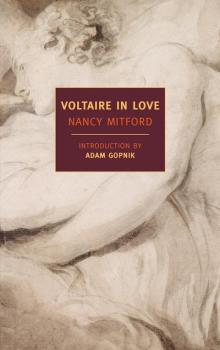 Voltaire in Love
Voltaire in Love Don't Tell Alfred
Don't Tell Alfred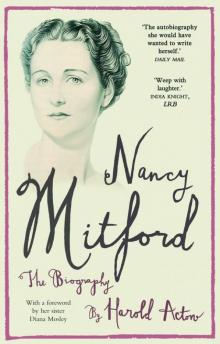 Nancy Mitford
Nancy Mitford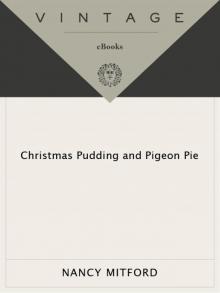 Christmas Pudding and Pigeon Pie
Christmas Pudding and Pigeon Pie